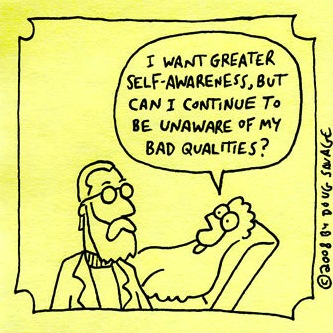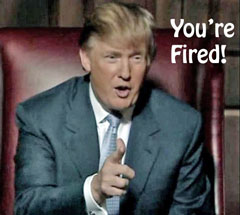
 When things begin to get real, accurate diagnosis and a true acknowledgment of the situation are typically forthcoming… at least, earnestly desired. This is unswervingly true when one’s own self-interest is at stake.
When things begin to get real, accurate diagnosis and a true acknowledgment of the situation are typically forthcoming… at least, earnestly desired. This is unswervingly true when one’s own self-interest is at stake.
In a recent Wall Street Journal article entitled “What’s in Your Blind Spot”, one’s own financial future and legacy are at stake with respect to “blind spots” and their potential impediment to advancement. The article encourages people with “great expectations” of leadership to utilize tools that enable greater self-knowledge… especially self-knowledge with respect to faults. Implied here is the idea that these business leaders possess unconscious faults that are alienating and, therefore, destructive to one’s prospects. Citing a 2011 study of managers, the article states:
The dismissed chiefs also assessed their abilities higher than others did, researchers found. “Overconfidence increased their tendency to avoid strategic changes needed to fix their employer’s financial performance,” explains Ithai Stern, a study co-author and assistant professor at Northwestern University’s Kellogg School of Management.
Hewlett-Packard Co. HPQ -3.18% fired Leo Apotheker last year after just 11 months at the helm because directors had grown frustrated with his reductions in its financial outlook, failure to rally troops and tendency to only consult a few associates, according to people familiar with the situation.
Mr. Apotheker lacked adequate “self awareness around his limitations,” suggests R.J. Heckman, CEO of PDI Ninth House. Mr. Apotheker declined to discuss his H-P tenure, but in response to an e-mailed question asking whether a lack of self awareness about his shortcomings contributed to his ouster, he says, “I’m not perfect, and who is.” An H-P spokesman declined to comment.
To fix his imperfections, Schwann’s Mr. Sherwin went through a rigorous performance appraisal known as “360-degree feedback” that included customers’ reaction. Hearing that others saw him as a fast-acting but arrogant cowboy “was a two-by-four between the eyes,” he says.
My intent in sharing this article with you is not as a “theologian of glory”… exhorting you to find your faults and fix them (although that is the author of the article’s purpose). My purpose is only to show, in a practical (and, ultimately, analogous) way, how dangerous trusting in your ability to objectively discern reality can be. Especially the objective reality about yourself. In other words, I commend to you the world of the unconscious… even though you probably won’t like what you find there.
There is a law of continuous and successful production in the world of business that demands adherence. Any violation of this law, conscious or unconscious, is a transgression against this law and subject to all sorts of consequences. Some are listed above.
This brings to mind a greater and eternal Law that is infinitely more profound: the Law of God. Is an unconscious violation of this most incomparable of laws actually a violation that finds itself under the same judgment as a conscious violation? That will be the subject of our next installment.
[youtube=http://www.youtube.com/watch?v=7dlN55SoF4Q&w=600]

COMMENTS
Leave a Reply













